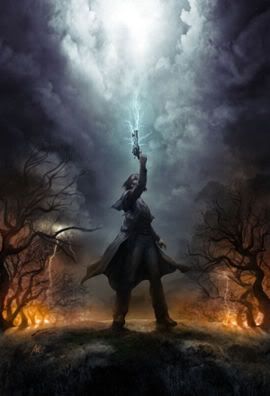
At this past weekend’s Philadelphia Writer’s Conference, I described myself as primarily a writer of ‘speculative fiction’. A few people asked me what I meant. There are some stereotypes that I think are assigned to areas of speculative fiction I’d like to dispel, and more depth in those stories when they’re done well than some might give them credit for. So let’s explore this a bit, shall we?
What Spec Fic Isn’t
Speculative fiction is not its setting. Science fiction, for example, is not just about spaceships and ray guns. It’s more about themes and methods of exploration regarding those themes than window dressing. The bits of speculative fiction that put it in those genres are the frosting on the cake, the chocolate around a Twix. There needs to be something under that frosting, inside that Twix, or it’ll be insubstantial. It might be sweet and you might find some people who are willing to eat that frosting neat from the container, but most people will want something with a bit more to it.
Joe McGee’s Six Guns and Shadows is a good example of this. It’s what I’d call a “paranormal Western.” It’s neither all about witches & warlocks, nor all about saloons and cowboys. It mixes those two and lays them on top of character exploration and theme. Now, it might be able to get by in some circles on the unique aesthetic alone, but without Lily having some depth and themes of self-acceptance and the preservation of tradition – which I assume is what he’s working on with the Moonstone – it might as well be a Jonah Hex knock-off or something. But Joe’s a smart guy and a cool cat. Witchslinger‘s going to kick ass.
What Spec Fic Is
In addition to being about something, having an emotional core as Chuck would say, speculative fiction lets a writer tackle issues, debates and controversies in a ‘safe’ environment. Heinlein wanted to discuss the romanticism of death and the dangerous allure of militarism, so he wrote Starship Troopers. H.G. Wells was concerned by an ever-widening gap between the elite and the working class, and penned The Time Machine. Jules Verne had ideas about exploration and politics that might have been a touch controversial for his time, and poured those notions into Captain Nemo when he created 20000 Leagues Under The Sea. J.R.R. Tolkien was worried that the lessons of the hard-fought wars that encompassed the world might be forgotten, and ensured they’d be preserved by writing The Lord of the Rings. C.S. Lewis re-imagined things he’d come to appreciate within The Chronicles of Narnia.
I think I’m belaboring my point a bit, but the “speculative” part of speculative fiction doesn’t just mean speculation on how things might be in the future or on another world or against a certain antagonist. They’re also places allowing for speculation on human nature, politics, religion, sustainability, you name it. So, want to discuss the neo-conservative movement but afraid of Glenn Beck calling you a Nazi or Rush accusing you of hating freedom? Set the discussion in space.
Now, settings do vary but fall into common groups – science fiction, fantasy, horror, paranormal, etc. I’m willing to elaborate on those more, but the point I’m getting at is that they all share the desire of an author to try something new and interesting while exploring relevant themes in a ‘safe’ way. I’ll discuss these things more at length in the future.


